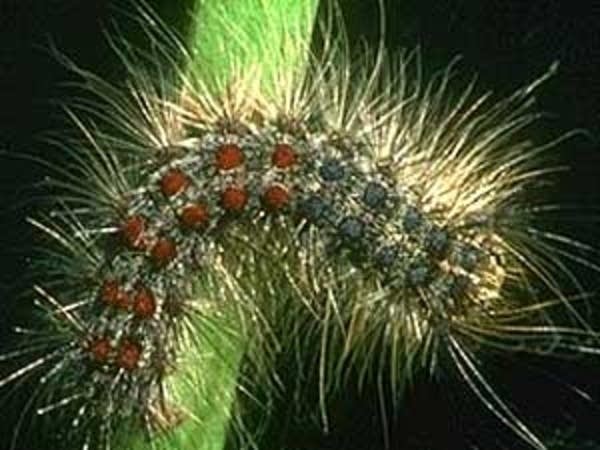Gypsy moth treatments set to begin in parts of Twin Cities metro area

Go Deeper.
Create an account or log in to save stories.
Like this?
Thanks for liking this story! We have added it to a list of your favorite stories.
Aerial treatments to control invasive gypsy moths are set to begin in the coming days in parts of the Twin Cities metro area.
The Minnesota Department of Agriculture said the treatment window opens Monday; the exact date of when the treatment will be applied by low-flying planes depends on weather conditions.
The two treatment areas are a 133-acre parcel along the Dakota-Scott county line in western Lakeville and parts of Credit River Township, and a 633-acre area in the southwestern part of Stillwater.
An area in Chisholm on the Iron Range also is slated for gypsy moth treatment later this summer.
Turn Up Your Support
MPR News helps you turn down the noise and build shared understanding. Turn up your support for this public resource and keep trusted journalism accessible to all.
Gypsy moth caterpillars, or larvae, can defoliate large swaths of forest; they were introduced to the East Coast of the U.S. in the 1800s and have been slowly spreading westward ever since. They don't generally kill trees directly, but the defoliation can weaken trees and make them more susceptible to other pests and diseases.
Marissa Streifel, gypsy moth treatment coordinator for the state Department of Agriculture, said the Minnesota is working with other states to slow the spread of the pest. That involves putting out traps to identify where there are outlier gypsy moth infestations.

"When we find gypsy moths ahead of (the) expanding population front, we try to treat those populations in order to eradicate them and slow the spread of the gypsy moth through the nation," she said. "Through this program we've been really able to reduce the rate of spread."
The treatments will take place around sunrise.
"On the treatment day, if you're in and around the area, if you're up that early, you would see an aircraft flying around," she said. "And then when the treatments are applied, the aircraft is going to fly very low — about 50 to 100 feet above the treetops."
Streifel said the planes spray a product known as Btk that is produced from bacteria in the soil, and specifically targets and kills gypsy moth caterpillars. Btk has been used for a number of years and has no known health effects on humans, pets, bees and other living things, she said; it's also organic-certified for crops.
Once the treatment is first applied, a second application will follow in five to 10 days.
Residents in the treatment areas can get more information by calling (888) 545-MOTH, or go to the ag department's gypsy moth treatment website. There's an option to sign up for text or email alerts when officials know the specific treatment date.



